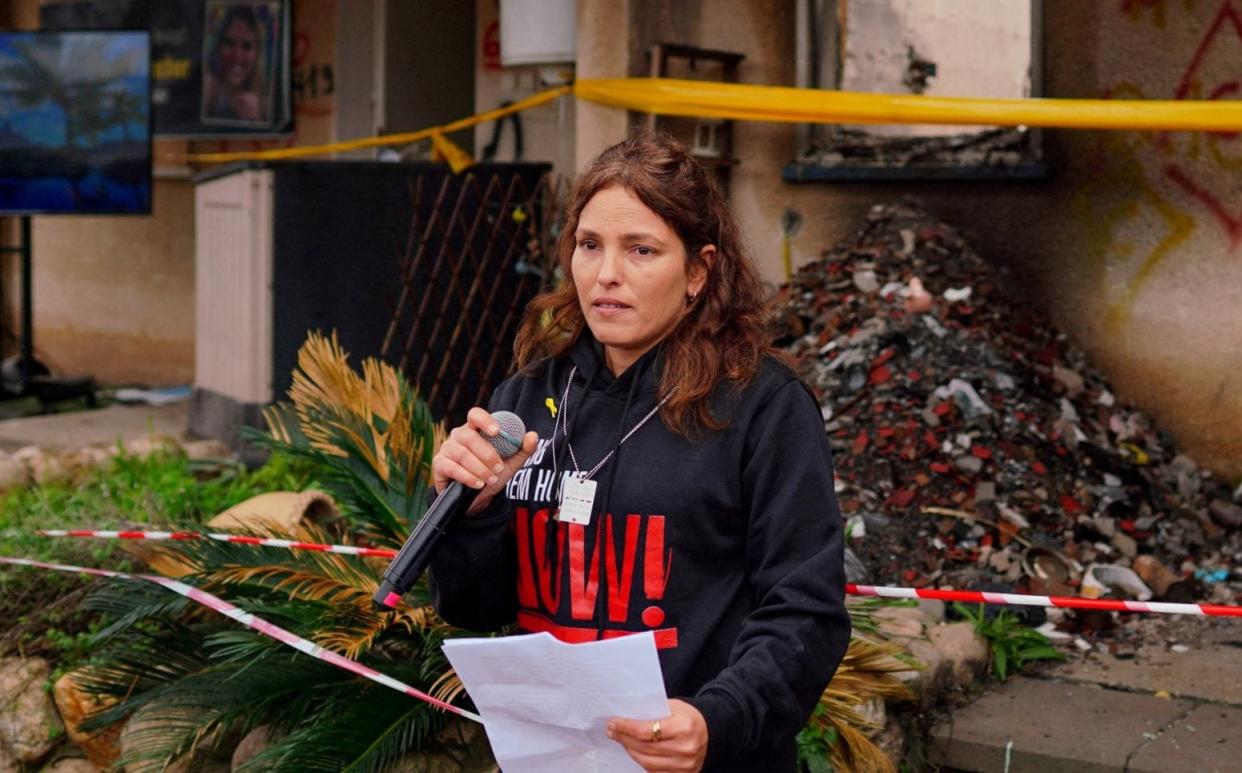Hamas guard sexually assaulted me at gunpoint, says Israeli hostage

An Israeli hostage kidnapped by Hamas was sexually assaulted in Gaza, doctors have confirmed.
Amit Soussana, a 40-year-old lawyer, went public with the story in an interview with The New York Times on Tuesday. Her testimony has been backed by two doctors and a social worker who spoke to her shortly after she was released.
She also recounted being tortured at another location.
Ms Soussana, who lived alone in the kibbutz of Kfar Azza, was woken up by the sound of gunfire after Hamas terrorists breached the perimeter fence. In a widely circulated video, Ms Soussana was seen being dragged into Gaza as a group of 10 men tackled her to the ground.
She spent the first few weeks of captivity in a child’s bedroom in what appeared to be an upscale house in Gaza.
Her guard, Muhammad, whom she described as a chubby, balding man with a wide nose, slept in the adjacent living room but often entered her room in his underwear, asking about her sex life and offering to give her a massage.
Fearful about a possible assault, Ms Soussana lied to the guard about her menstrual cycle, hoping to put him off.
Around Oct 24, the guard sexually assaulted her, she said.
Hit at gunpoint
The man entered the bathroom, forced Ms Soussana to remove her towel, hit her and dragged her at gunpoint to the bedroom,
“Then he, with the gun pointed at me, forced me to commit a sexual act on him,” she said.
The attacker reportedly came back to her room later, showing remorse and asking her: “Please don’t tell Israel.”
The woman was transferred to another house three weeks after the kidnapping where she was kept with four other hostages.
Ms Soussana said a group of captors bound her feet and hands and “suspended her across the gap between two couches and beat her”.
She was released in a hostage deal with Hamas after spending 55 days in captivity.
She underwent a thorough medical examination, and a few hours after her release spoke to a gynaecologist and a social worker about the sexual assault. The pair filed a joint medical report. A second doctor spoke to her about the assault a few days later.
Hamas has denied previous, unnamed reports of sexual violence against Israeli hostages.
Hamas calls for an end to air-drops
It came as Hamas asked the West on Tuesday to stop air-dropping supplies into Gaza.
Parachutes with parcels of food packages were dropped on the hunger-stricken north of Gaza on Tuesday morning, with crowds rushing towards them.
At least six people were killed in a stampede and 12 more drowned as they tried to retrieve the parcels from the sea, according to Hamas officials.
Hamas urged the West to put “an immediate end to air-drop operations” and pressed Israel into allowing more deliveries of aid by road.
Unicef also called for more aid deliveries by road, rather than air or sea, to avert an “imminent famine”.
Benjamin Netanyahu, the Israeli prime minister, recalled his country’s delegation from talks with Hamas, indirectly blaming the United States for the terrorist group’s “delusional demands” following a UN Security Council vote that called for a ceasefire in the enclave.
Mr Netanyahu’s office said in a statement: “Hamas is not interested in continuing negotiations and reaching the deal, and is an unfortunate testimony to the damaging nature of the UN Security Council’s decision”.
Hamas insisted on Tuesday that Mr Netanyahu and his cabinet were “entirely responsible for the failure of negotiation efforts and for preventing an agreement from being reached up until now”.
Qatar’s foreign ministry spokesman, however, said later on Tuesday that the talks were “ongoing”, adding there had been no “development that would lead to thinking that one of the teams has pulled out of the negotiations”.
‘Reasonable grounds’ to suspect genocide in Gaza
Also on Tuesday, the UN’s special rapporteur on the occupied Palestinian territories presented a report on the war in Gaza, saying there were “reasonable grounds” to believe that Israel was committing genocide.
Francesca Albanese said 25,000 tons of explosives, as powerful as two nuclear bombs, had been used to level entire neighbourhoods.
She also pointed out what she described as the deliberate destruction of Gaza’s vital infrastructure, from hospitals to water supplies and farm fields.
Israel insists it is taking steps to prevent civilian casualties and only targets the sites used by Hamas fighters.

 Yahoo News
Yahoo News 
